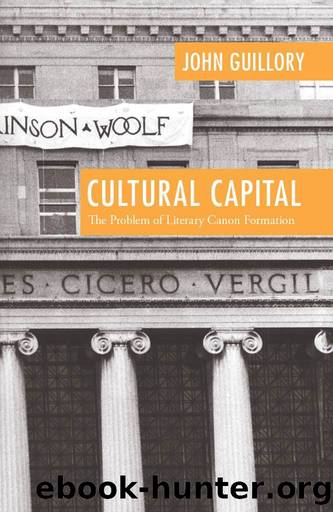Cultural Capital: The Problem of Literary Canon Formation by John Guillory

Author:John Guillory [Guillory, John]
Language: eng
Format: azw3, epub
Publisher: University of Chicago Press
Published: 2013-09-14T16:00:00+00:00
De Man goes on to describe the process articulated here as the âgram-matization of rhetoric,â which is also called the âmetonymization of metaphor.â The sequence of binaries can now be represented as follows:
metaphor vs. metonymy
analogy vs. contiguity
necessity vs. contingency
rhetoric vs. grammar
The schema is curious not simply for positing trope on both sides of its antithesesâthe evacuation of the grammatical terminology necessitates the double duty of tropeâbut also for the more or less casual assumption that the equation of metaphor with rhetoric is sufficiently grounded in the concept of paradigmatic substitution. The semantic operation of trope is as capable of being conceptualized as displacement as it is of being conceptualized as substitution, and in that sense metonymy might just as well have been taken to represent rhetoric (as in Lacanian tropology). The appropriateness of such an assignment of metonymy to ur-tropological status would on the face of it accord with the overarching conceptualization of rhetoric as productive of an effect of linguistic indeterminacy, an effect which puts into question the necessity of defining the metaphysical pretensions of metaphor. What logic, then, governs the assignment of metaphor to rhetoric, and metonymy to grammar?
The above schema suggests that de Man generates his major concepts out of an analysis of tropes themselves; but let us consider the possibility that the logic of the argument moves in exactly the opposite direction. What if the role assigned to the Jakobsonian tropes were determined from the first by the concepts of necessity and contingency, and tropes were being employed simply as the âtechnicalâ rhetorical names for these thematic notions? At this point we must look more closely at the two tropes of metaphor and metonymy as de Man identifies them in Proustâs text. The metaphor, we are told, is established by the link between the music of the flies and summer; but this trope does not look at first glance like a metaphor at all since the music of the flies does not substitute for the summer in its absence. The music is not like the summer; it is as much a part of the summer as the quality of the light, or renewed vegetation. The relationship is associative rather than analogical, and the form of association is specifically synecdochic in that âsummerâ names the sum of the constituents enumerated by Proust. But the relation is also conventionally metonymic, in that the music of the flies enacts a reversal of cause and effect: the chamber music is an effect of summer days, but is said to âguaranteeâ their return. How, then, does de Man identify the trope as a metaphor? In this way:
The ânecessary linkâ that unites flies and summer is natural, genetic, unbreakable; although the flies are only one minute part of the total event designated by âsummer,â they nevertheless partake of its most specific and total essence. The synecdoche that substitutes part for whole and whole for part is in fact a metaphor, powerful enough to transform a temporal contiguity into an infinite duration: âBorn of the sunny days .
Download
Cultural Capital: The Problem of Literary Canon Formation by John Guillory.epub
This site does not store any files on its server. We only index and link to content provided by other sites. Please contact the content providers to delete copyright contents if any and email us, we'll remove relevant links or contents immediately.
The Power of Myth by Joseph Campbell & Bill Moyers(1057)
Half Moon Bay by Jonathan Kellerman & Jesse Kellerman(979)
Inseparable by Emma Donoghue(976)
A Social History of the Media by Peter Burke & Peter Burke(974)
The Nets of Modernism: Henry James, Virginia Woolf, James Joyce, and Sigmund Freud by Maud Ellmann(891)
The Spike by Mark Humphries;(809)
The Complete Correspondence 1928-1940 by Theodor W. Adorno & Walter Benjamin(783)
A Theory of Narrative Drawing by Simon Grennan(775)
Culture by Terry Eagleton(770)
Ideology by Eagleton Terry;(731)
World Philology by(712)
Farnsworth's Classical English Rhetoric by Ward Farnsworth(711)
Bodies from the Library 3 by Tony Medawar(707)
Game of Thrones and Philosophy by William Irwin(707)
High Albania by M. Edith Durham(698)
Adam Smith by Jonathan Conlin(686)
A Reader’s Companion to J. D. Salinger’s The Catcher in the Rye by Peter Beidler(675)
Comic Genius: Portraits of Funny People by(649)
Monkey King by Wu Cheng'en(646)
